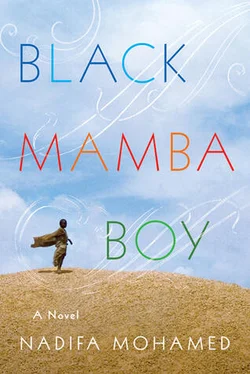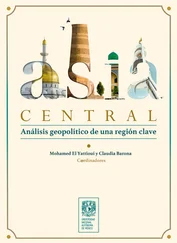A man with moss green teeth waved him back down. “Fransiis, Fransiis, settle down, they’re just Frenchies, country boy, haven’t you been out of the wilderness before?” His mocking bloodshot eyes stayed on Jama as he sat down and self-consciously composed himself.
A breeze blew into Jama’s face, the smell of salt blowing in from the Red Sea, and the warm wetness of the air gave him an impression of traveling through a town at the bottom of the ocean. The lorry slowed down in traffic, and arms and legs grew out of the blankets around him, stretching and straightening. They had reached their destination. Their lorry sat sadly in the traffic, after so many miles of whistling along clear desert roads, chuggering out sooty smoke from its rattling exhaust pipe. They climbed out of the back, passing a few coins to one of the many arms sticking out of the driver’s cab, heads all fixed ahead, cheeks bulging with masticated qat. Jama felt like fainting; the heat from the vehicles pushed up the temperature by a few more unbearable degrees. Cars and lorries were strung in a neat chain while army vehicles tried to weave in and out of the line, their horns blasting a path through, and muscled pink forearms waved directions at the uninterested crowd. Drivers had left their seats to converse but now they jeered at the pompous legionnaires. Still only on the outskirts of Djibouti Town, Jama could already feel its bustling energy. He approached the beginning of the traffic jam and saw its cause; European soldiers manned a checkpoint and were nearly taking apart the vehicles in search of smuggled goods. Ignoring the complaints and abuse of drivers, banana crates were jimmied open, livestock were released from their pens, sleeping travelers were patted down. Amid all this commotion Jama eased his way around the checkpoint behind the backs of armed legionnaires.
A wide boulevard opened up before him. Jama dawdled along, enjoying the novelty of paving slabs under his feet. In Hargeisa the ground was made up of a hundred different types of sand but there was not one paving slab in the whole town. Here, palm trees grew by the side of the street, evenly paced out like guards. Buildings stood in the distance, with a style at odds with Somali or Adeni construction; they were curvaceous and tall, and built to last much longer than the edifices of the British in Hargeisa. This town was conjured up from the fantasies of its conquerors, a home away from home despite the anti-European climate; a provincial French town picked up and dropped into the hottest place on earth. Stalls were laid out by the street under grass awnings, groups of women sold just watermelons, or just bananas, or just oranges.
As Jama walked on, the street came to life, market boys argued and fought, young mothers with chains of copper coins over their foreheads sat outside chatting as their babies slept. Old women shuffled around barefoot, discreetly begging, suited men came back home for siestas and to await the qat deliveries. A pretty mosque with red and turquoise banners flying from its minarets gave out the aadaan; water was sold from the backs of dozy-looking donkeys like in Hargeisa. No one paid any notice to the eleven-year-old, as this was a town accustomed to a constant tide of newcomers, Yemenis, Afars, Somalis, Indians, French colonials, all feeling that this town belonged to them. There were clashes, love affairs, and friendships among the communities but there was also just plain indifference.
Jama wandered around, happy to be back to the energy of Aden, getting a thrill from the taxis whizzing past, the wet heat wrapped around his body. The shops and stalls, their bright goods laid out for admiration, pulled at him. If it wasn’t for his hunger to see his father, he would have disappeared into the market’s crowded alleys to find friends among the filth and chicanery. Nosy goats peered out from doorways, nibbling delicately on vegetable peels and oily paper wrappers as they silently observed the passing crowd with inquisitive eyes. Their thirsty, frustrated kids jittered around under their feet, trying to grab at their hoisted teats, the milk commandeered for human enjoyment by red, blue, or yellow cloth guards tied around their mothers’ dripping udders. The crush of life around Jama was breathtaking, after the space and wide horizons of Somaliland. It seemed bizarre for so many people to be concentrated in one place. And the noise! It was as if he had been deaf for months and his ears had cracked open, allowing a cacophony of shouting, swearing, music, and arguing to pour in. Men stood around corners in knots, leaning against crumbling walls, their thin chests sticking out from unbuttoned shirts, sweat cascading down their fine features, qat stalks clamped between their teeth, their eyes followed market girls, probing and prodding them as they sashayed past.
Jama sat under a palm tree and scanned around for another lorry, but he was at the heart of a vast shantytown and could see no way out. Under the shade of the palm, surrounded by noise and movement, everything started to swim around Jama, donkey carts traversed the sky and birds flew with their backs to the ground. Jama’s eyes rolled back and his head slammed onto the dirt.
_______
When he woke up, Jama realized he had been moved. He was in a small damp room, facing a peeling blue door that creaked on its hinges with the breeze. Through the dim light he saw a cat with a leopard coat dart out into the street as clattering footsteps approached. Jama shut his eyes quickly as a man and woman entered. “What have you done, Idea?” the woman gasped.
“I found him outside, Amina, he had collapsed under the palm tree. I tried to wake him and give him water, but he was dead to the world, so I brought him in.”
The woman rushed over to Jama and placed a hand on his head. “Honey, you’re burning up, what’s wrong?”
Jama mouthed words at her but nothing came out. She put a glass of water to his mouth, and it burned as it slid down his parched throat. “I’ll get him some rice.” She rushed off, agile legs like springs beneath her, uncovered hair flaring around her in black and gray rivulets. The husband stood over Jama, his mouth lopsided, Jama staring at it from the corner of his eye. When he smiled a row of golden teeth peeked out, and a smile inched across Jama’s face at the memory of Shidane and his silly tale of smugglers hiding diamonds within their gold teeth. The husband, thinking that the boy was smiling at him, released his full, droopy, manic-looking smile, his eyes twinkling in the dark room. “So, who is this strong young man?” the wife called out.
“This boy has come to be my ally, Amina, so I won’t be bullied anymore by you and the hags you call friends,” replied her husband in a deep voice.
“Ignore him, my son, he’s unemployed,” teased his wife.
“Jama Guure Mohamed Naaleyeh Gatteh Eddoy Sahel Beneen Samatar Rooble Mattan,” stated Jama proudly. The man and woman nodded approvingly, hiding their amusement.
“And who are your people?” asked Amina.
“Eidegalle.”
“Ah, a noble Eidegalle has fallen into our Issa hands. Don’t you know our clans are at war?” Idea laughed. Jama was entranced by this eccentric man and his outlandish face. When he was serious, he cocked his head to one side and his mouth was set in a sad slope, but then he would explode with mirth, and his eyes, nose, lips, and teeth would fly in different directions. Jama quickly learned that this man could speak English, French, Afar, and Arabic as well as Somali, but spent his time cooking, cleaning, and loving his wife, who worked as a cleaner in a colonial office.
Idea was the man’s name, or to be more precise his nickname, given to him by his childhood friends because of his intelligence. He had been a teacher in government schools until, disheartened with the uses that the colonial government made of that education, he had put down his chalk and become the only male wife in Djibouti. Idea saw that the schools did not disseminate knowledge but propaganda, blinding the young to any beauty or good in themselves. On hard benches the children were taught everything French and nothing about themselves; they were only dark slates to be written over with white chalk. He spoke to Jama as if he were talking to an old friend. In fact, so beguilingly that Jama lost his guarded manner and told him things in return; how he was going to find his father, why he had left Hargeisa, and how he had learned Arabic and a smattering of Hindi and Hebrew on the streets of Aden. They spoke animatedly in a Somali interlaced with Arabic, attracting Amina’s mockery. “Oh, here he goes again! Always showing off, why don’t you use that babble babble to get a job, eh? No use knowing those birdy languages if you just sit at home.”
Читать дальше
Конец ознакомительного отрывка
Купить книгу












